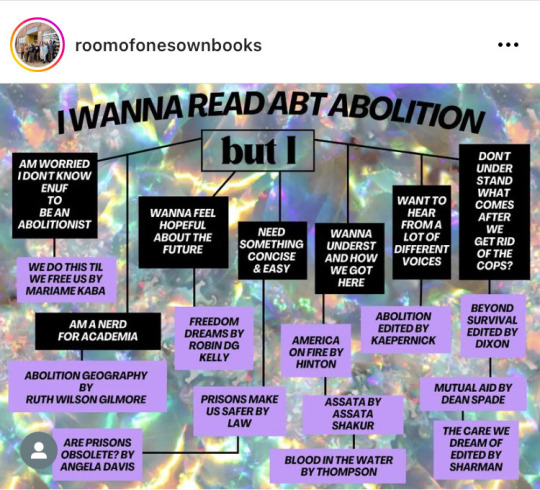Photo

Alai Ganuza, Pink Bathroom Oil on canvas, 30 x 30cm
21K notes
·
View notes
Photo



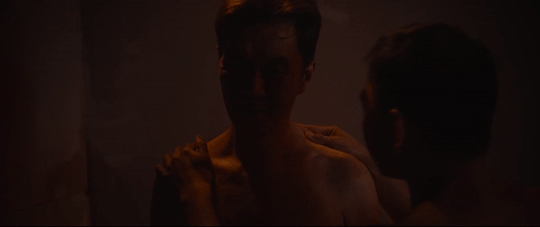



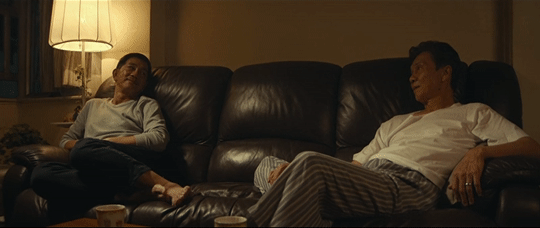


叔.叔 | TWILIGHT’S KISS (2019) dir. Ray Yeung Pak, 70, a married taxi driver who refuses to retire meets Hoi, 65, a retired single father. Although both are secretly gay, they are proud of the families they have created through hard work and hardship over the years. Hoi is a member of the Mature Tongzhi Society, a social group, which caters for gay men who are over 60. The group is planning to attend a public forum to request the government to create senior citizen homes dedicated exclusively for gay people. However, due to the fact that most men in the group are in the closet, there is no one who is willing to voice their opinions there. Hoi supports the notion of a gay senior citizen home and considers speaking in the forum, however, when he begins to wonder whether his son Wan suspect he is gay his attitude shifts. As Pak and Hoi fall in love, they contemplate a possible future together. (link in title)
299 notes
·
View notes
Text
still amazes me that by season 45 or whatever, Supernatural was being exclusively watched by delusionally hopeful women with flamingo-salinity tolerance for bad writing and the creators still couldn’t pander to them because maybe there was 1 straight guy out there still accidentally watching it
#oh I actually know the one straight man who was watching it and it was my high school physics teacher#we bonded over both watching it while I was actually in high school#saw him like 9 years later and abt six months after the show ended and he excitedly asked me abt the finale#I only knew anything abt what happened bc of tumblr lmao
123K notes
·
View notes
Text
today i found out that when monarch butterflies migrate south for the winter, all the ones that go across the middle of lake superior suddenly stop going south and go west for five miles and then continue south. which really freaked scientists out cos like What is in the Middle of Lake Superior what do Butterflies know that We Dont Is This The End Times etc. anyway turns out about a hundred million years ago there was a mountain there and the butterflies still think they gotta fly around it. classic butterflies
645K notes
·
View notes
Photo
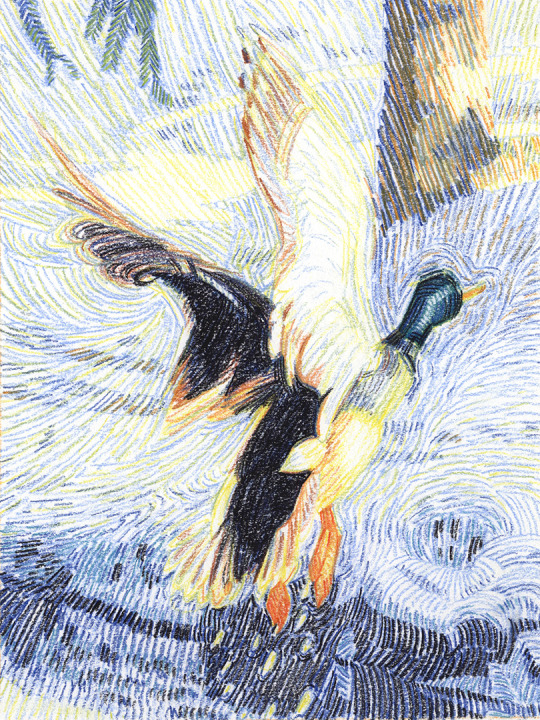
Duck Taking Flight, 2023 Chalk pastel on illustration board. 8 x 6 in. For sale! (DM me for pricing). Testing out some energetic pastel hatching on this photo of a duck I took in Confederation Park a while ago.
11K notes
·
View notes
Text
truly some people have no genre savviness whatsoever. A girl came back from the dead the other day and fresh out of the grave she laughed and laughed and lay down on the grass nearby to watch the sky, dirt still under her nails. I asked her if she’s sad about anything and she asked me why she should be. I asked her if she’s perhaps worried she’s a shadow of who she used to be and she said that if she is a shadow she is a joyous one, and anyway whoever she was she is her, now, and that’s enough. I inquired about revenge, about unfinished business, about what had filled her with the incessant need to claw her way out from beneath but she just said she’s here to live. I told her about ghosts, about zombies, tried to explain to her how her options lie between horror and tragedy but she just said if those are the stories meant for her then she’ll make another one. I said “isn’t it terribly lonely how in your triumph over death nobody was here to greet you?” and she just looked at me funny and said “what do you mean? The whole world was here, waiting”. Some people, I tell you.
107K notes
·
View notes
Text
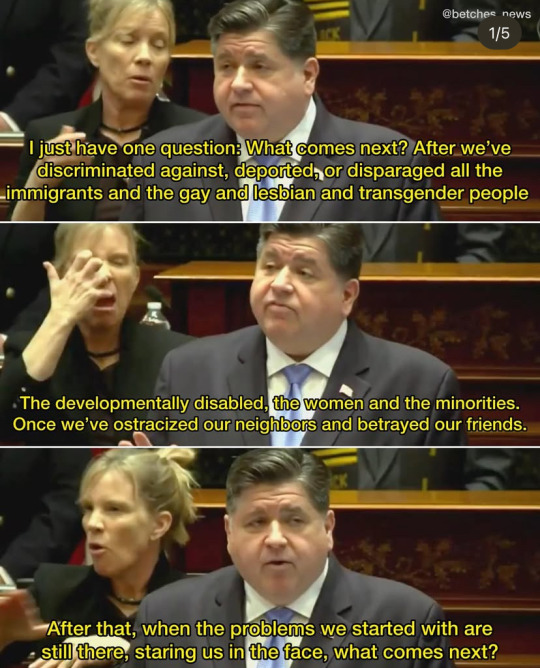
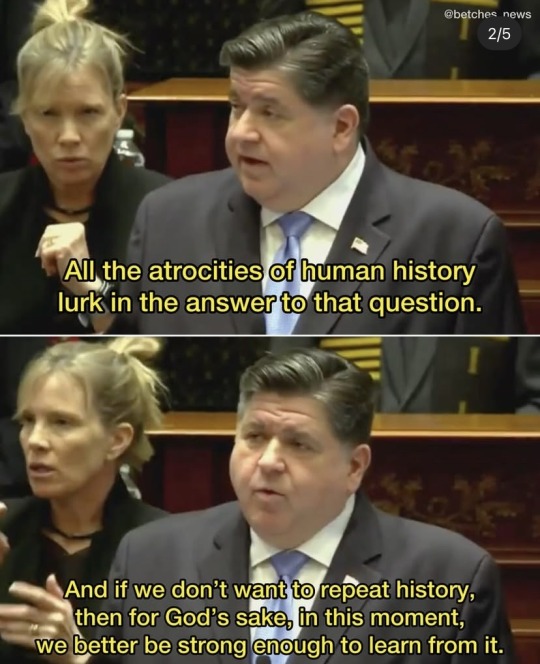
There are people – some in my own Party – who think that if you just give Donald Trump everything he wants, he’ll make an exception and spare you some of the harm. I’ll ignore the moral abdication of that position for just a second to say — almost none of those people have the experience with this President that I do. I once swallowed my pride to offer him what he values most — public praise on the Sunday news shows — in return for ventilators and N95 masks during the worst of the pandemic. We made a deal. And it turns out his promises were as broken as the BIPAP machines he sent us instead of ventilators. Going along to get along does not work – just ask the Trump-fearing red state Governors who are dealing with the same cuts that we are. I won’t be fooled twice.
I’ve been reflecting, these past four weeks, on two important parts of my life: my work helping to build the Illinois Holocaust Museum and the two times I’ve had the privilege of reciting the oath of office for Illinois Governor.
As some of you know, Skokie, Illinois once had one of the largest populations of Holocaust survivors anywhere in the world. In 1978, Nazis decided they wanted to march there.
The leaders of that march knew that the images of Swastika clad young men goose stepping down a peaceful suburban street would terrorize the local Jewish population – so many of whom had never recovered from their time in German concentration camps.
The prospect of that march sparked a legal fight that went all the way to the Supreme Court. It was a Jewish lawyer from the ACLU who argued the case for the Nazis – contending that even the most hateful of speech was protected under the first amendment.
As an American and a Jew, I find it difficult to resolve my feelings around that Supreme Court case – but I am grateful that the prospect of Nazis marching in their streets spurred the survivors and other Skokie residents to act. They joined together to form the Holocaust Memorial Foundation and built the first Illinois Holocaust Museum in a storefront in 1981 – a small but important forerunner to the one I helped build thirty years later.
I do not invoke the specter of Nazis lightly. But I know the history intimately — and have spent more time than probably anyone in this room with people who survived the Holocaust. Here’s what I’ve learned – the root that tears apart your house’s foundation begins as a seed – a seed of distrust and hate and blame.
The seed that grew into a dictatorship in Europe a lifetime ago didn’t arrive overnight. It started with everyday Germans mad about inflation and looking for someone to blame.
I’m watching with a foreboding dread what is happening in our country right now. A president who watches a plane go down in the Potomac – and suggests — without facts or findings — that a diversity hire is responsible for the crash. Or the Missouri Attorney General who just sued Starbucks – arguing that consumers pay higher prices for their coffee because the baristas are too “female” and “nonwhite.” The authoritarian playbook is laid bare here: They point to a group of people who don’t look like you and tell you to blame them for your problems.
I just have one question: What comes next? After we’ve discriminated against, deported or disparaged all the immigrants and the gay and lesbian and transgender people, the developmentally disabled, the women and the minorities – once we’ve ostracized our neighbors and betrayed our friends – After that, when the problems we started with are still there staring us in the face – what comes next.
All the atrocities of human history lurk in the answer to that question. And if we don’t want to repeat history – then for God’s sake in this moment we better be strong enough to learn from it.
I swore the following oath on Abraham Lincoln’s Bible: “I do solemnly swear that I will support the constitution of the United States, and the constitution of the state of Illinois, and that I will faithfully discharge the duties of the office of Governor .... according to the best of my ability.
My oath is to the Constitution of our state and of our country. We don’t have kings in America – and I don’t intend to bend the knee to one. I am not speaking up in service to my ambitions — but in deference to my obligations.
If you think I’m overreacting and sounding the alarm too soon, consider this:
It took the Nazis one month, three weeks, two days, eight hours and 40 minutes to dismantle a constitutional republic. All I’m saying is when the five-alarm fire starts to burn, every good person better be ready to man a post with a bucket of water if you want to stop it from raging out of control.
Those Illinois Nazis did end up holding their march in 1978 – just not in Skokie. After all the blowback from the case, they decided to march in Chicago instead. Only twenty of them showed up. But 2000 people came to counter protest. The Chicago Tribune reported that day that the “rally sputtered to an unspectacular end after ten minutes.” It was Illinoisans who smothered those embers before they could burn into a flame.
Tyranny requires your fear and your silence and your compliance. Democracy requires your courage. So gather your justice and humanity, Illinois, and do not let the “tragic spirit of despair” overcome us when our country needs us the most.
Sources:
• NBC Chicago & J.B. Pritzker, Democratic governor of Illinois, State of the State address 2025: Watch speech here | Full text
• Betches News on Instagram (screencaps)
86K notes
·
View notes
Text

154K notes
·
View notes
Photo

Okay so I made these without the cinnamon and nutmeg and lemme just tell you:
THESE MUFFINS TASTE EXACTLY LIKE DOUGHNUTS.
I DUNNO WHAT KIND OF VOODOO I PULLED IN THE KITCHEN BUT SLAP MY NIPPLES AND CALL ME BETSY BECAUSE THEY TASTE LIKE DOUGHNUTS HALLELUJAH IN THE HIGHEST.
60K notes
·
View notes
Photo







Whoops im an idiot and accidentally deleted this post from May.
Did 40 minute studies of birds for a week because I was feeling stuck, but wanted to say I at least tried for a little bit each day.
21K notes
·
View notes
Text

Phyllis Shafer (American, b.1958)
"Cadmium Sluice," 2023
Oil on linen
18 x 20 in
3K notes
·
View notes
Note
I’ve gotta say, I think I’d be philosophically abolitionist either way, like, I want to think I’d understand how harmful the cops are separate from my own experiences,
And,
My abolitionist bent got truly cemented when the following two things happened to me:
1) I got violently mugged in the middle of the day on a Saturday; choked, beat up, left in a fetal position on the sidewalk. The people who mugged me came from behind me; I saw nothing other than their hands hitting my head. Somebody else called the cops on my behalf. The cops did nothing but berate me for not seeing the people who attacked me, and ask me how on earth I couldn’t have seen them—to the extent that for a split second I wondered whether I was lying about having not seen my attackers, even though I knew I wasn’t. Nothing else came of calling the cops. They literally just made it worse and traumatized me further.
2) I was an RA in undergrad and somebody who worked in the building had started cutting the shower curtains in the women’s bathrooms short. My resident caught this person when he was sticking his phone under her shower curtain to take a photograph or video or something. She didn’t see his face but knew who it was from a variety of contextual details. The cops were called by building staff. They refused to believe she knew who it was, and scolded her for not responding correctly—for not running out of the shower immediately, still naked, to see her violator’s face. Again, they were worse than useless—they made the situation worse and traumatized her further.
I get so sick of the argument ‘who are you supposed to call when something bad happens’.
Who the fuck are you supposed to call now? The cops sure as fuck don’t help.
Read the cop post you reblogged. Apologies if I’m being too literal. I’ve had ppl break into my house before. What am I supposed to do in that situation? Shoot the person? Let them shoot me? Genuinely asking for an alternative bc I don’t want to call the cops ever. It just feels like it’s often ppl who don’t live in areas with higher crime who post stuff like that and it feels out of touch with the reality some are living in. Most ppl in my neighborhood don’t want to abolish the police. It’s white liberals, leftists, anarchists who get to live that out more. Idk if this makes sense, but would love to hear others thoughts.
I have also had people break into my home, I've heard drills run on my block multiple times in just the past year, I've witnessed multiple shootings, violent domestic assault outside my home, etc. I also live in a racially diverse area and speak regularly with my neighbors and yeah, a 70-year-old Black grandmother in Chicago is far more likely to be a pro-cop Trump supporter than she is to be a radical anarchist. Your average person of any identity group is unlikely to be an abolitionist or anarchist... because those are still extremely fringe political positions in this world. Now it is also experience that the majority of actually committed abolitionists are Black & brown people, but that doesn't mean a majority of people from those identity groups in general are abolitionists at all. The white leftie abolitionists...mostly aren't actually abolitionists in practice from all that I've seen. Give them a roommate who doesn't pay the bills and has a mental health episode and they'll wield the tools of the state just as readily as anybody.
And that kinda brings me to one of my questions. Has calling the cops worked for you when you have had to deal with a home invasion, robbery, attack, etc? I just mentioned this in another post, but in my case *threatening* to call the cops has helped sometimes. The existence of the police state as a threat did help keep my stalker from going further when he broke into my apartment. But when a person (especially a person in a non-wealthy, majority-nonwhite area) calls the cops, how often do they show up soon enough to be helpful? How often do they confuse the attacker and the victim? How often do they blame the victim and refuse to file a report? How often do they attack or kill the wrong person? How often does their presence escalate things and cause people to panic, causing more violence?
I'm not trying to be a little shit here, I know that the answer is not "100% of the time". Sometimes, in the present world, a person is overpowered and in danger and they have no support network around them and they call the cops and the sirens or the sight of big dudes with guns scares their attacker away. I have, once or twice, witnessed some version of that too. It didn't do anything to get the victim away from their abuser or prevent harm from happening in the long term, but it did cause people to scatter.
Of course the long term abolitionist answer is that we need community networks of support to keep one another safe, to prevent crimes motivated by need, to deescalate conflict, and maybe even to secure justice and safety by scaring abusers and rapists etc off. In the absence of those things formally existing, I think we should all do what we can to build those networks of support in our communities, and thinking about how we can address problems without using the police. I wrote about some examples of that I witnessed and lived through here:
I don't think there are many great options right now if a person is attacked. I know that I minimize my involvement with the police as much as I humanly can. Again, only you can decide for yourself what you believe, what you can do, what you need, what you think is right.
185 notes
·
View notes
Text
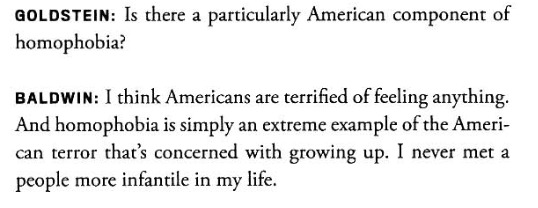

Richard Goldstein & James Baldwin | The Last Interview
25K notes
·
View notes
Text
40K notes
·
View notes









